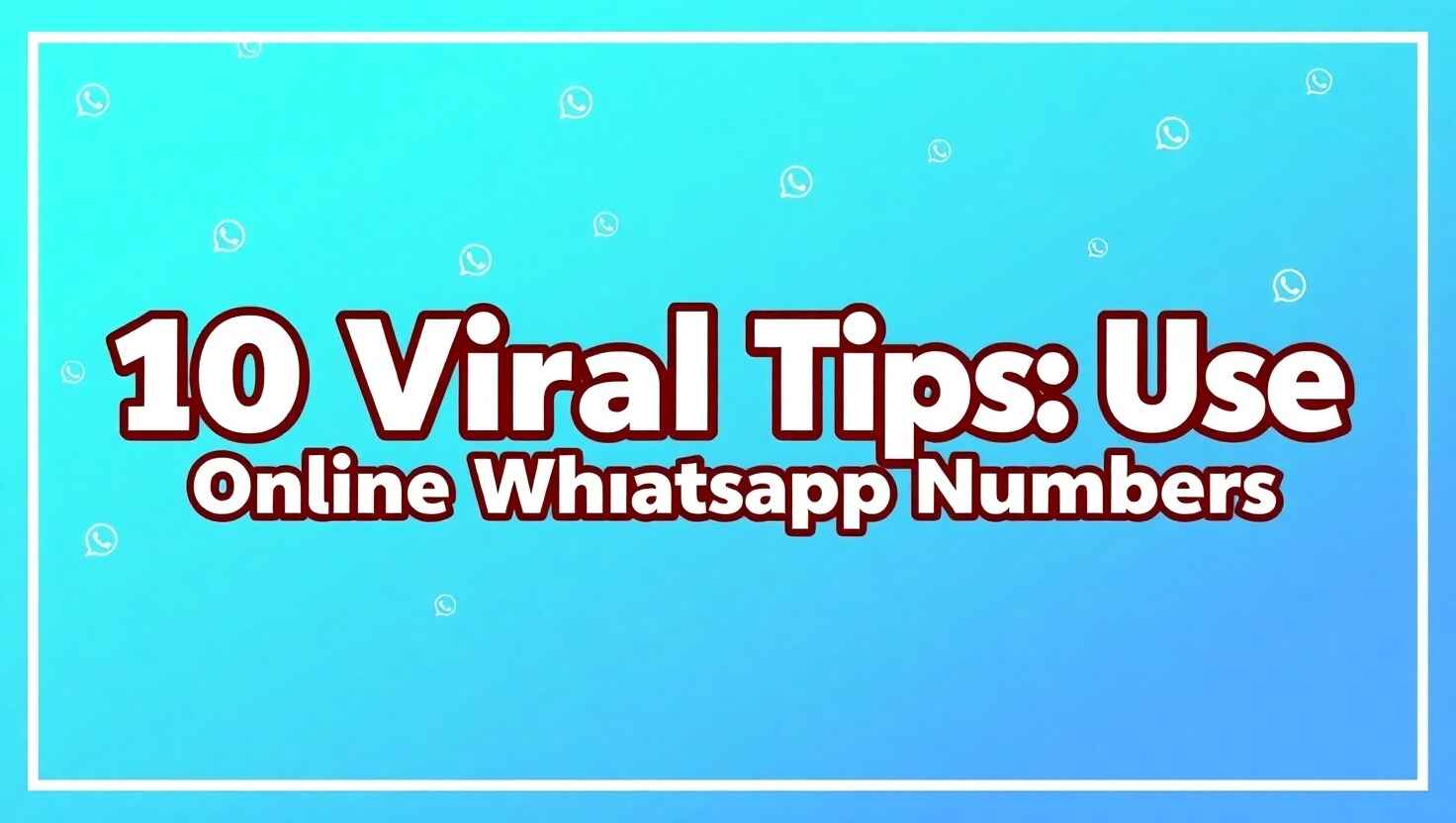Best Viral Tips to Use Online WhatsApp Number
This guide tells you: how to safely use online WhatsApp numbers? WhatsApp has become a hotspot for viral money-making schemes, free recharge offers, and investment tips—often shared via “Viral Tips Online WhatsApp Numbers“. While some of these numbers may offer legitimate opportunities, many are fraudulent traps designed to steal money or personal data.
- Best Viral Tips to Use Online WhatsApp Number
- Verify the Source Before Contacting
- Never Share Personal or Financial Details
- 🔐 Why It’s Critical
- 💣 Common Scam Tactics to Watch Out For
- 🚨 Red Flags to Instantly Spot a Scam
- ✅ Pro Tip: Stay Anonymous While Testing
- 🧠 Real-World Incident
- 🛑 A Simple Universal Safety Rule to Apply
- Test with a Small Amount First
- 🎯 Why It’s a Smart Move
- 🎭 How Scammers Lure Victims
- 🧪 Safe Approach: How to Test Responsibly
- 🔒 Pro Tip: Mask Your Identity Smartly
- 💡 Real-Life Warning
- ✅ Bottom Line:
- Beware of Fake ‘Government’ or ‘Company’ Offers
- 🕵️♂️ Why These Scams Are So Dangerous
- 🚨 Recent Scam Examples That Went Viral
- 🧪 How to Confirm If an Offer Is Legit
- 🧾 Case Study: The “Free Jio Recharge” Hoax
- ⚠️ Red Flags to Watch For
- ✅ Pro Tip: Trust Only Official Communication
- 🛡️ Golden Advice
- Join Only Trusted Referral & Reward Groups
- 🔍 Why This Matters More Than You Think
- 🎭 Legitimate vs. Fake Groups: How to Spot the Difference
- 🧪 How to Safely Participate in Referral Programs
- 🎓 Real-World Example: Group Faking as an “Amazon Task Group”
- ✅ Pro Tip: Use Referral Platforms with Track Records
- 🚫 Avoid These Common Traps
- 🛡️ Golden Tip to Avoid Being Scammed
- Use Reverse Number Lookup Tools
- 🕵️♂️ Why Reverse Lookup Is Your First Line of Defense
- 🔧 Cools Apps to Verify Any WhatsApp Number
- ⚠️ Warning Signs to Watch For
- 🧪 How Scammers Try to Bypass These Checks
- ✅ Pro Tip: Be Wary of New or Unrated Numbers
- 🛡️ Remember This
- Avoid “Auto-Money” or “No Work” Schemes
- 💸 Too Good to Be True? It Probably Is.
- 🎯 What These Scams Typically Look Like
- 🧠 The Psychology Behind the Trap
- ✅ Pro Tip: Legitimate Earning Apps Don’t Ask for Deposits
- 🧪 How to Validate a “Money-Making” Offer
- 🔥 Real Cases to Learn From
- 🚫 Key Red Flags to Watch For
- 🛡️ No Work = No Money
- Report & Block Suspicious Numbers
- 🚨 Why Reporting Matters
- 🛠️ Steps to Take When You Suspect a Scam
- 📊 How It Helps
- ✅ Pro Tip: Warn Your Circle
- 💡 Real Example
- 🔐 Silence Helps the Scammer—Speak Up
- Use a Separate WhatsApp Account for Trials
- 🧠 Why It’s Smart
- 🛠️ How to Set It Up Safely
- 🧩 Real-World Use Cases
- ✅ Pro Tip: Never Link Your Main Number to Untested Offers
- 🔐 Extra Layer: Don’t Save Contacts or Share Too Much
- 🛡️ Think Like a Tester, Act Like a Pro
- Stick to Verified Online Earning Methods
To help you navigate this risky landscape, we’ve compiled 10 expert-backed viral tips to safely engage with these WhatsApp numbers while avoiding scams.
Verify the Source Before Contacting
🔍 Why It Matters
In the digital age, scammers thrive by mimicking legitimacy. A number offering “viral tips” might be shared across multiple platforms, sometimes accompanied by fake success stories or doctored testimonials. These messages often spread rapidly through:
- WhatsApp forwards
- Instagram reels or comments
- YouTube video descriptions
- Telegram channels
Once you message the number, you might be added to a spam list, prompted to click on harmful links, or even encouraged to send payments with no traceable return.
According to CyberPeace Foundation, a significant number of cyber scams in India involved impersonation or misleading communication through platforms like WhatsApp. The foundation also notified that many phishing attempts originate from unverified sources, often disguised as promotional offers or free giveaways.
🛡️ How to Check if a Number is Trustworthy
🔎 1. Search the Number on Google
Enter the WhatsApp number in quotes (e.g., "+91XXXXXXXXXX") into a search engine.
- If the number has been reported as a scam, you’ll likely see results on forums like Reddit, Consumer Complaints, or Scamwatch websites.
- Check platforms like Truecaller, which flag numbers based on community reports.
🌐 2. Look for an Official Website or Domain
Any real marketing agency or influencer growth service will typically have a proper website.
- Confirm whether the WhatsApp number is listed on their official “Contact Us” page.
- Use tools like Whois Lookup to verify how long the domain has been active and whether it aligns with the company’s claimed identity.
📱 3. Check Social Media Presence and Credibility
Scam numbers often circulate through low-quality social accounts with:
- Few followers
- Stock photos or plagiarized content
- Generic or spammy comment sections (e.g., “DM for growth” repeated on every post)
In contrast, legitimate businesses and creators:
- Use brand-matched usernames (e.g., @ViralTipsPro)
- Post genuine client testimonials
- Include a verified contact method across bios and posts
✅ Pro Tip
If a number is shared by a verified Instagram account, popular YouTuber, or company with a real-world presence, there’s a much higher chance it’s genuine. Look for blue checkmarks, media features, or partnerships with known platforms to validate legitimacy.
⚠️ Real Example:
A widely circulated number in 2022 promised “100K followers in 3 days” and was later flagged by Cybercrime Helpline India after multiple users reported unauthorized transactions and malware links being shared post-contact.
Never Share Personal or Financial Details
🔐 Why It’s Critical
While the promise of viral success or fast earnings may sound exciting, it’s also the perfect bait for social engineering scams. Fraudsters behind viral-tip WhatsApp numbers often exploit urgency and trust to trick users into revealing sensitive information.
The Reserve Bank of India (RBI) and CERT-In (Indian Computer Emergency Response Team) have both issued advisories warning users against sharing OTPs, UPI PINs, or any banking credentials through informal platforms like WhatsApp. Once this data is exposed, it’s enough to compromise your financial accounts or digital identity within seconds.
A 2023 report by NortonLifeLock estimated that over 65% of digital scam victims unknowingly shared personal details during fake “online earnings” interactions, especially those circulated via messaging apps.
💣 Common Scam Tactics to Watch Out For
Here are some classic examples seen in scammy WhatsApp conversations:
- Send your bank details to receive your influencer payment.
→ The scammer uses this to initiate unauthorized transactions or create a fake loan account in your name. - Verify the identity by sharing the One-time Password sent to the phone.
→ This is a classic method to hijack your WhatsApp, Google, or bank account. - Pay a small ₹99 fee to unlock your viral content boost earnings.
→ Once you pay, they vanish — or worse, ask for more under new pretexts.
These messages often use FOMO (Fear of Missing Out) or a false sense of urgency: “Offer valid for today only”, “You’ve been selected”, or “Payment waiting for approval”.
🚨 Red Flags to Instantly Spot a Scam
| 🚩 Red Flag | 🚫 Why It’s Dangerous |
|---|---|
| Asking for any of UPI PIN, CVV, or OTP | These are not all needed for receiving money — only for sending it. |
| Link asks you to log in to WhatsApp | Could be a phishing page meant to hijack your account. |
| Pressure to pay upfront or within minutes | Scam playbook 101 — rush the target before they think. |
If the conversation feels rushed, scripted, or overly enthusiastic, pause. Scammers often copy-paste the same message to thousands of victims hoping for one bite.
✅ Pro Tip: Stay Anonymous While Testing
If you’re curious and want to test an offer without risking your primary identity:
- Use a virtual number from tools like Google Voice (for U.S. users) or TextNow (available globally with VPN).
- Avoid linking this number to any of your financial services, and disable backup/restore options in WhatsApp when registering.
This setup allows you to investigate or validate claims without exposing your real phone number, email, or bank info.
🧠 Real-World Incident
In 2022, a Bengaluru-based freelance designer lost ₹38,000 after engaging with a WhatsApp number promising “reels monetization tips.” The scammer, pretending to be from a “YouTube payout partner,” convinced him to share a UPI OTP — effectively draining his bank account in minutes. The incident was reported in The Times of India as part of a broader pattern of influencer-targeted scams.
🛑 A Simple Universal Safety Rule to Apply
The golden rule of digital safety still applies:
“If someone asks for sensitive info out of the blue, stop and question everything.”
WhatsApp itself could be a trusted app but sharing personal, financial or identity information is never safe, no matter how convincing the person on the other end may seem.
Test with a Small Amount First
🎯 Why It’s a Smart Move
Many scams don’t start with a demand for large sums. Instead, they ask for something small — ₹50, ₹100, or ₹499 — amounts that feel too trivial to question. This technique is called “micro-investment fraud”, and it’s become increasingly popular in WhatsApp-based viral schemes.
As per a 2023 cybersecurity report, over 42% of victims first paid a small amount believing it was a harmless trial or entry fee. The psychological play here is subtle: low risk, high return. But once a scammer sees a successful small transaction, they often follow up with bigger demands or disappear entirely.
🎭 How Scammers Lure Victims
Scammers posing as “viral tip coaches” or “social media monetization agents” commonly send messages like:
💬 Just invest ₹500 and get ₹5,000 in return within 48 hours. Our methods are 100% real and used by influencers!
💬 Send ₹100 to get access to our exclusive WhatsApp group with trending content tips.
💬 Pay ₹49 now and we’ll boost your Insta reel views to 10K overnight!
These messages prey on your desire for fast results and use real influencer buzzwords like “engagement hacks,” “reach booster,” or “niche secrets” to sound legit.
🧪 Safe Approach: How to Test Responsibly
If you feel the number might be legitimate but you’re unsure, here’s a more secure way to validate it without risking too much:
1. Limit Payment to a Symbolic Amount:
Start with ₹10–₹50 at most. Never go above that on a first interaction.
2. Use Wallets with Privacy Settings:
Apps like PayTM, PhonePe, or GPay allow you to hide your full name in UPI transactions. You can also create a secondary wallet account to avoid exposing your main bank details.
3. Watch for Red Flags After Payment:
- Do they respond after receiving money?
- Do they suddenly demand more?
- Are they delaying access to the promised group or content?
🛑 If the number blocks you right after the payment, that’s an immediate confirmation it was a scam. Report the number on WhatsApp and to cybercrime.gov.in.
🔒 Pro Tip: Mask Your Identity Smartly
If you’re running a test, consider:
- Using a prepaid virtual debit card (like from Fi, NiyoX, or Zerodha Jupiter) loaded with just ₹100–₹200.
- Setting up a temporary email ID and not linking your personal accounts during the exchange.
- Turning off “read receipts” and “last seen” in WhatsApp settings to avoid being profiled.
These extra steps add a layer of security and make it harder for scammers to exploit or trace your identity.
💡 Real-Life Warning
In 2021, a Delhi college student was duped out of ₹10,000 through a WhatsApp group offering “paid shoutouts for viral growth.” The group initially required a ₹99 joining fee, followed by fake proof of others earning money. Once she sent more payments for “upgrades,” the group was deleted overnight. The case was highlighted by top news channels and became a common example of how micro-payment traps escalate.
✅ Bottom Line:
When in doubt, test with caution, and never assume small payments are safe just because they seem “too low to scam.” Scammers rely on volume — even ₹50 from 1,000 people makes them ₹50,000 in a day.
Beware of Fake ‘Government’ or ‘Company’ Offers
🕵️♂️ Why These Scams Are So Dangerous
Scams that impersonate official entities — whether private companies like Airtel or public institutions like the Indian Government — are among the most successful because they exploit public trust. When you see messages claiming to offer free mobile recharges, government grants, or financial benefits, it’s natural to assume some truth behind them. That’s what scammers count on.
A 2023 alert by PIB Fact Check (Government of India’s fact-checking arm) revealed a spike in fake WhatsApp forwards related to “PM schemes,” fake EPFO updates, and fraudulent offers from leading telcos. These scams often direct users to message or call specific WhatsApp numbers — which are controlled by fraudsters trained to sound convincing.
🚨 Recent Scam Examples That Went Viral
- ₹500 free recharge – A link asks users to message a number to claim the reward. The number then asks for OTP or payment “verification.”
- Get ₹10,000 from the government – A WhatsApp forward falsely claims a new grant is being given under a non-existent scheme.
- IRCTC refund helpline on WhatsApp – Fake customer service numbers ask users to install remote-access apps or pay for faster processing.
From time to time, TRAI and CERT-In issue warnings confirming that scammers use spoofed caller IDs, fake logos, and WhatsApp business profiles to pose as customer support or scheme enrolment officers.
🧪 How to Confirm If an Offer Is Legit
Don’t rely on WhatsApp forwards — always cross-check via these steps:
| ✅ Step | 🔍 What to Do |
|---|---|
| Check the official website | For Airtel: www.airtel.in For govt schemes: www.india.gov.in |
| Use verified customer care | Use numbers from official sites, not from WhatsApp messages or image forwards. |
| Look for domain authenticity | Government schemes always end in .gov.in. Anything else (e.g., pm-yojana(dot)info) is suspicious. |
| Verify via Twitter (X) | Brands and govt departments often tweet scam warnings — follow verified handles. |
🧾 Case Study: The “Free Jio Recharge” Hoax
In mid-2022, a message went viral offering a ₹399 recharge for free via a WhatsApp number. The victim was asked to “pay ₹49 for verification,” and once the payment was made, they were asked to share the OTP sent by UPI. Their bank account was emptied within minutes.
The scam was though soon flagged by company’s official support handle on Twitter/X, and thousands of such fake recharges were reported during the Diwali period alone.
⚠️ Red Flags to Watch For
| 🚩 Red Flag | 🚫 What It Means |
|---|---|
| Uses political names in informal messages | Legitimate government schemes follow formal communication channels |
| Requests payment for “verification” | Govt schemes never ask for money over WhatsApp |
| WhatsApp business profile with minimal followers | May be spoofed — don’t trust unless it’s officially verified |
| Promises “guaranteed income,” “instant refunds” | No real scheme guarantees cash without checks |
✅ Pro Tip: Trust Only Official Communication
Neither the Government of India nor reputed companies like Airtel, Jio, or SBI ask for payments or documents via WhatsApp. In fact, PIB Fact Check frequently tweets to debunk such hoaxes.
📢 If an offer claims to be from a government body or company but comes via a WhatsApp number, treat it as suspicious until verified.
🛡️ Golden Advice
When a message says, “Forward to 10 groups to claim your grant” or “Message now to get ₹500 recharge”, remember this:
Scammers use fake urgency and fake authority. Don’t be their next victim.
Always double-check with:
- Official websites
- Verified social media handles
- Direct customer care calls (not forwarded numbers)
Join Only Trusted Referral & Reward Groups
🔍 Why This Matters More Than You Think
Referral programs and reward-based WhatsApp groups have exploded in popularity, especially among people looking for easy side income. From cashbacks and gift cards to product discounts and bonus commissions, the potential sounds exciting.
But here’s the catch — scammers know this too. In recent years, there’s been a surge in fake WhatsApp groups that imitate legit programs like Amazon Affiliates, Meesho resellers, or Flipkart referral bonuses, but are actually traps designed to steal your money or data.
A 2023 report done by a top lab revealed that over 60% of scam WhatsApp groups in India were themed around fake referral/reward schemes. Most of these began with promising free rewards and ended with requests for small payments or personal details under the pretext of “activation,” “admin fees,” or “unlocking levels.”
🎭 Legitimate vs. Fake Groups: How to Spot the Difference
| ✅ Legitimate Groups | ❌ Fake Groups |
|---|---|
| Official company branding and logos | Poorly written descriptions or generic icons |
| Admins use business numbers or are company representatives | Admin identity hidden, vague, or anonymous |
| No upfront payment required to join or access rewards | “Pay ₹100 to unlock daily earning tasks” |
| Invite links come from verified websites or apps | Random forwarded invites from unknown numbers |
| Rules are transparent and clearly defined | No structure or filled with copy-paste testimonials |
| Contact support available via official channels | No support, or WhatsApp-only numbers with no trace |
According to a 2024 MeitY advisory, no verified Indian brand uses WhatsApp groups as the only way to distribute referral benefits. The program is always listed on their official websites or apps first.
🧪 How to Safely Participate in Referral Programs
1. Stick to Known, Verified Platforms:
Only join programs from platforms that you can confirm through:
- Their official websites
- Play Store/App Store apps
- In-app referral dashboards (e.g., Meesho, CashKaro, Amazon)
2. Avoid Payment Requests:
If a group asks you to “pay to unlock premium tasks” or “get admin approval” via a QR code, it’s a red flag. Legit referral systems don’t charge money to let you promote their products.
3. Search for the Group Name Online:
Try searching on Google or Twitter. Many scams are reported online. If the group name or admin number shows up in scam forums or Reddit threads, avoid immediately.
🎓 Real-World Example: Group Faking as an “Amazon Task Group”
In 2022, several users reported fake WhatsApp groups claiming to be “Amazon Referral Task Teams.” The groups used Amazon logos and shared “earnings screenshots” to build trust. Once users joined, they were asked to:
- Complete tasks for ₹20 rewards
- Pay ₹199 to “unlock VIP tasks”
- Share Aadhaar or PAN for “tax verification”
One victim ended up losing over ₹15,000 through incremental payments. Amazon India later issued a public advisory, clarifying they run no such WhatsApp referral program, and reported the groups to CERT-In.
✅ Pro Tip: Use Referral Platforms with Track Records
If you want to earn through referrals and rewards, use platforms that have real user bases and established payment history:
- 🛒 Meesho – India’s top reseller platform, known for safe referral commissions.
- 🛍️ Amazon Associates – The official affiliate program, accessible only via their affiliate site.
- 💰 CashKaro – Approved by big brands and runs transparent cashback programs.
- 🧾 CRED, Slice, PhonePe – Offer occasional referral bonuses via app only, not WhatsApp.
These platforms offer:
- Dashboard to track earnings
- Transparent payment policies
- No upfront charges
🚫 Avoid These Common Traps
- “💸 Pay ₹99 and earn ₹500 daily — No work needed!”
- “🎁 Join our VIP reward group — Limited spots!”
- “📞 Add 50 people to our group to claim ₹1,000 PayTM cash.”
These are almost always fake, and many are run by coordinated fraud networks using fake testimonials, stolen logos, and psychological tricks.
🛡️ Golden Tip to Avoid Being Scammed
When it comes to referral or reward groups on WhatsApp:
If it’s not verified by a known brand, not listed on their app, and asks for money — it’s not worth your trust.
Don’t let a ₹100 scam today cost you your peace of mind tomorrow.
Use Reverse Number Lookup Tools
🕵️♂️ Why Reverse Lookup Is Your First Line of Defense
When a WhatsApp number pops up promising rewards, business opportunities, or urgent requests, your first reaction should be skepticism—not trust.
That’s where reverse number lookup tools come in. They allow you to investigate a phone number’s reputation, ownership patterns, online activity, and user complaints—often before you even hit “Reply.”
According to a 2024 Norton Security study, over 70% of scam-related messages on WhatsApp were tied to numbers that already had publicly available scam reports, many of which could have been flagged early using basic reverse search tools.
🔧 Cools Apps to Verify Any WhatsApp Number
Here are the most effective and widely trusted tools to investigate WhatsApp numbers—all free or with free tiers:
1. Truecaller
- What it does: Identifies caller names, spam tags, and crowd-sourced flags.
- How to use: Enter the number in the Truecaller app or Truecaller Web.
- Why it’s helpful: Millions of users mark scam/spam numbers here. If a number has been reported repeatedly, you’ll see red alerts instantly.
🔍 Example: A number claiming to be from “Flipkart Rewards” but flagged by 4,500 users as a “UPI scam” is clearly unsafe.
2. ScamAdviser
- What it does: Verifies the trustworthiness of websites and domains linked to a number.
- How to use: Go to their website and search for URLs shared by the number.
- Why it’s helpful: Many scam numbers send links (e.g., “bit(dot)ly/rewards-2025”). ScamAdviser checks these links for:
- Fake hosting countries
- Recent domain registration
- Risky IP addresses
📉 Red Flag: If a site is less than 3 months old and hosted on a privacy-shielded server, it’s often fake.
3. Social Media & Web Search
- What to do: Simply Google the number in quotes (e.g.,
"+91 98765 43210 scam"). - Why it’s helpful: If someone else has been targeted, forums like Reddit, Quora, or CyberCrime India might already list the number.
🧑💻 Try this: Also search on Twitter or Facebook. If the number is running a mass campaign, it’ll appear in public posts or scam alerts.
⚠️ Warning Signs to Watch For
| Sign | What It Might Mean |
|---|---|
| Number has no online presence | Possibly brand new, temporary, or bought number used for scams |
| Truecaller shows names like “Fund Transfer” or “Lucky Draw Bot” | Likely fake or previously used for bulk scams |
| ScamAdviser gives the site a trust score below 30% | High risk—avoid clicking or transacting |
🧪 How Scammers Try to Bypass These Checks
- Use newly registered WhatsApp Business numbers to appear legit.
- Share links shortened with bit.ly or tinyurl to hide destination sites.
- Constantly switch numbers once flagged or blocked.
That’s why a reverse lookup is just the first filter—you still need to cross-verify messages, demands for money, and any urgency cues.
✅ Pro Tip: Be Wary of New or Unrated Numbers
If a WhatsApp number:
- Has no caller ID data on Truecaller,
- Doesn’t appear in any public search,
- Has a profile photo that looks AI-generated or stolen,
then it could be part of a fresh scam campaign.
💡 Tip: Legit businesses or influencers typically have numbers that are searchable, rated, and used across multiple verified platforms.
🛡️ Remember This
“Just because a number has a display picture and a WhatsApp Business tag doesn’t mean it’s legit.”
Treat every unknown number like a cold call from an unverified stranger. Use tools. Take 30 seconds to check. It might avert your a big loss—or worse, identity theft.
Avoid “Auto-Money” or “No Work” Schemes
💸 Too Good to Be True? It Probably Is.
The internet—and especially WhatsApp—is full of messages claiming you can make money while you sleep, without any work or skills:
- “Earn ₹1,000/day just by forwarding this message.”
- “WhatsApp bot pays ₹5 per click. Just sign up and relax!”
These are usually baited traps. Whether it’s a pyramid scheme, a malware installer, or a data phishing scam, these messages are designed to exploit your trust, not boost your bank account.
🎯 What These Scams Typically Look Like
| Promise | Hidden Trap |
|---|---|
| “Passive income with no work” | You’ll be asked to deposit money or share personal data |
| “Click ads and earn instantly” | Redirects you to malware-laden pages |
| “Earn from home by sending WhatsApp messages” | You become a cog in a multi-level scam scheme |
These messages often use flashy language, emojis, and exaggerated testimonials—sometimes even fake screenshots of payment receipts—to convince you to act fast.
🧠 The Psychology Behind the Trap
According to the CyberPeace Foundation and CERT-In reports, these scams leverage urgency and greed to override your judgment.
- “Offer valid for 100 people only!”
- “This group is already making money—join now!”
- “Don’t miss out on today’s ₹2,000 bonus.”
These pressure tactics are red flags. Legitimate platforms don’t beg for urgency—they build trust through transparency.
✅ Pro Tip: Legitimate Earning Apps Don’t Ask for Deposits
If a so-called money-earning app or scheme asks you to:
- Pay a joining fee
- Purchase a “starter pack”
- Send money to unlock features
🚨 That’s your cue to back off.
🔐 Real, reputable apps never do this. Examples include:
- Roz Dhan – Pays small amounts for reading news, referrals, etc. No deposit required.
- CashKaro – A cashback and coupon platform with verified partners like Amazon, Flipkart.
- Google Task Mate (when active) – Pays users for performing local tasks, no fees involved.
All of these are available on official app stores, have user reviews, and are regulated by Indian payment laws.
🧪 How to Validate a “Money-Making” Offer
Before trusting a WhatsApp number that promises quick money, do the following:
- Search the scheme’s name + “scam” on Google or YouTube Example:
"WhatsApp auto bot pays scam" - Check if the app is available on Google Play or Apple App Store
- If not, it’s likely fake or malware.
- See if they demand money first
- Even if it’s ₹50-₹100, it’s often the start of a bigger con.
🔥 Real Cases to Learn From
- 2023: Hundreds were scammed via WhatsApp by a “click-and-earn” app that promised daily payments. The app stole their contacts and forced them to recruit others (classic pyramid model).
- 2022: Cybercrime units in Delhi busted a group running “Auto WhatsApp Income” programs. Victims had lost over ₹10 crores collectively.
🚫 Key Red Flags to Watch For
| Red Flag | Meaning |
|---|---|
| Only APK download links shared | App is not verified by app stores—malware risk |
| Multiple spelling errors and odd grammar | Often a sign of international scam operations |
| No company name, PAN, or T&C mentioned | Zero legal accountability |
🛡️ No Work = No Money
“If it doesn’t feel like work, it’s either charity—or a con.”
Real income takes effort, time, and skill, not random WhatsApp forwards or bots. When in doubt, pause and investigate. Your money, identity, and device security depend on it.
Report & Block Suspicious Numbers
🚨 Why Reporting Matters
Every day, thousands of WhatsApp users fall victim to scams involving fraudsters using random phone numbers. While blocking the number helps protect you, reporting it helps protect others—and assists law enforcement in tracing larger scam networks.
🛠️ Steps to Take When You Suspect a Scam
- 📸 Take Screenshots of the Chat
- Capture the message content, phone number, and any suspicious links.
- This is crucial evidence for cybercrime authorities and WhatsApp.
- ⛔ Block the Number on WhatsApp
- Go to the chat → Tap the three dots menu → More → Block.
- This prevents further messages or calls from the scammer.
- 🚩 Report the Incident via Official Channels:
- Cyber Crime Portal (India)
- Visit their website 🌐
- Choose “Report Other Cybercrime” → Select “Financial Fraud” or “Social Media Fraud”.
- Upload screenshots and add scam details.
- Reports can be made anonymously.
- WhatsApp In-App Reporting
- Go to: Settings → Help → Contact Us
- Or long press the chat → Tap the three dots → Report.
- WhatsApp will investigate and may suspend the number if it violates their policies.
- Cyber Crime Portal (India)
📊 How It Helps
| Action | Result |
|---|---|
| Reporting to WhatsApp | Helps suspend numbers linked to mass scams or abuse |
| Reporting to Cyber Crime | Assists police in building cases and tracking fraud networks |
| Blocking the number | Prevents further spam or fraud attempts to you personally |
According to the Ministry of Home Affairs (India), reporting promptly can improve chances of recovering scammed money, especially in UPI frauds where fast intervention matters.
✅ Pro Tip: Warn Your Circle
If you’ve identified a scam number:
- Forward the number and a brief warning to your friends, family, or groups you trust.
- Educate others on the signs of scams and urge them to avoid replying or paying.
- Consider posting a warning in forums like Reddit India, Twitter, or consumer complaint boards to alert the public.
📣 Your alert can prevent dozens from falling into the same trap.
💡 Real Example
Last year, some users in Delhi and Hyderabad began forwarding messages about a scammer impersonating an eCommerce delivery agent. Hundreds of people avoided getting tricked because someone took the time to share the number and warning publicly.
🔐 Silence Helps the Scammer—Speak Up
Scammers thrive in silence. Every report weakens their network. Think of blocking and reporting not just as a defense but as a public service. Your action today could save someone else’s money—or even identity—tomorrow.
Use a Separate WhatsApp Account for Trials
🧠 Why It’s Smart
In today’s digital age, your phone number is your identity. Many scams start simply because users share their primary WhatsApp number with shady offers, fake groups, or unknown business promotions. Once scammers have your main number, they can:
- Access your profile photo, bio, and last seen
- Attempt phishing or malware through links
- Spoof your identity or even target your contacts
Creating a separate account for risky or unverified trials keeps your personal and professional life protected.
🛠️ How to Set It Up Safely
🔹 Get a Second SIM
- Use affordable prepaid options like (Note: The price may change):
- Jio ₹61 plan
- Airtel ₹49/₹99 data-only plans
- These are inexpensive and perfect for one-time registrations or testing unverified services.
🔹 Use Dual SIM Smartphones
- Most Android phones support dual-SIM functionality.
- Assign your secondary SIM to work solely with apps like WhatsApp Business or cloned WhatsApp using tools like Parallel Space or Dual Apps (built-in on many phones).
🔹 Install WhatsApp Business
- It’s a free app available on Android/iOS.
- Supports separate profile, auto-responses, and labels.
- You can easily set up a second WhatsApp using your secondary SIM without interfering with your main app.
🧩 Real-World Use Cases
| Purpose | Risk If Using Main Number | Benefit of Using Trial Number |
|---|---|---|
| Joining reward groups | Exposure to data leaks | Keeps your identity safe |
| Testing “earning” bots | Potential malware or phishing | Sandbox for risk-free trials |
| Exploring viral offers | Spam and privacy breaches | Limited exposure |
According to cybersecurity firm Kaspersky, one in three viral offers via WhatsApp contain links to data harvesters or adware. Using a secondary number creates a buffer that limits your risk.
✅ Pro Tip: Never Link Your Main Number to Untested Offers
Scammers often buy or trade verified mobile numbers for malicious campaigns. Once your primary number is tied to a scam:
- You may receive phishing links regularly.
- Your number could be added to more scam lists.
- You risk being impersonated on platforms like Telegram or SMS.
By keeping a separate WhatsApp account, you control the blast radius in case of fraud.
🔐 Extra Layer: Don’t Save Contacts or Share Too Much
Even on your test WhatsApp:
- Avoid using your real name or photo.
- Don’t sync contacts or grant unnecessary permissions.
- Disable read receipts, last seen, and about visibility to limit what strangers can see.
🛡️ Think Like a Tester, Act Like a Pro
Would you hand over your personal email and home address to a random stranger? Then why give your real WhatsApp number to unknown groups or offers?
👉 Set up a safe, isolated testing environment for digital trials. It’s a small step that prevents big regrets.
Stick to Verified Online Earning Methods
🌐 Why This Matters
In an era of rising unemployment and inflation, the temptation to earn money quickly is understandable. Scammers exploit this vulnerability by circulating viral WhatsApp numbers with exaggerated promises like:
💬 “Earn ₹5,000/day from your phone—no skills needed!”
💬 “Auto-income bot — just forward messages and get paid!”
But let’s face it: real income comes from real work. If something promises easy money for no effort, it’s either:
- A pyramid scheme
- A phishing attempt
- Or a malware trap
Instead of chasing illusions, explore verified platforms that pay consistently and legitimately.
✅ Safer Alternatives to Viral Numbers
Here are trusted ways people across India (and globally) are earning online in 2025:
1. Freelancing
- Platforms: Fiverr, Upwork, Freelancer
- Skills you can use: Writing, graphic design, coding, online marketing, and video editing.
- 🔐 Payouts are secure and client-verified.
2. Affiliate Marketing
- Example: Amazon Associates, Flipkart Affiliate Program
- How It Works: Promote products via links → earn a % on sales
- Works well for those with a blog, YouTube channel, or strong social media presence.
3. Content Monetization
- Platforms: YouTube Partner Program, Twitch
- How you earn: Through ads, brand deals, live stream tips (Super Chats), and paid subscribers.
- 🔍 Requires consistency, but pays well in the long run
4. Stock Market & Mutual Fund Investment
- Trusted Apps: Zerodha, Groww, Upstox
- Start investing with as low as ₹100
- Not a get-rich-quick, but a powerful long-term income builder
🔍 Quick Comparison
| Criteria | Verified Methods | Viral WhatsApp Schemes |
|---|---|---|
| Transparency | High – T&Cs are public | Low – Hidden details |
| Risk | Low to Medium (skill-based) | High (financial fraud, malware) |
| Community Trust | Backed by real users | Anonymous or unverifiable |
| Income Sustainability | Long-term growth possible | Short-term bait or scams |
🔐 Pro Tip: If It Sounds Too Easy, It’s Probably Fake
According to a 2023 CERT-IN report, over 70% of cyber complaints involving financial loss came from WhatsApp-based scam offers. Most used psychological tricks like urgency (“Only 100 spots left!”), greed (“Instant returns”), and impersonation (“PM Modi scheme”) to trap users.
💡 Real Story: From Scam to Freelance Success
Rohit, a 22-year-old student from Lucknow, lost ₹1,000 to a fake WhatsApp survey job in 2022. Disheartened but determined, he started learning graphic design via free YouTube tutorials and joined Fiverr in early 2023. By 2025, he’s earning ₹25,000+ per month through real client work.
👉 The difference? A verified platform and a real skill.
🚀 Final Word: Build, Don’t Chase
Scammy WhatsApp numbers offer shortcuts, but shortcuts often lead nowhere. Instead:
- Learn a skill 🧑💻
- Be patient 💪
- Stick to trusted earning ecosystems
The road may be slower—but it’s real and rewarding.






